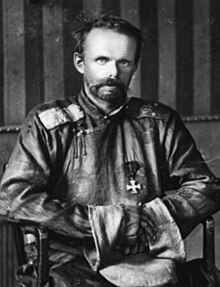Roman von Ungern-Sternberg

Baron Roman Fyodorovich Ungern von Sternberg (Russian Роман Фёдорович Унгерн фон Штернберг) (January 22, 1886, new style — September 15, 1921) a.k.a. Black Baron, leutenent-general, one of the military commanders on the side of White movement during the Russian Civil War, later an independent warlord in pursuit of pan-monarchist goals in Mongolia and territories East of Lake Baikal.
Ungern was born on the island of Dago, Russian Empire (now Hiiu County, Estonia) in a family of ethnic German nobility. He graduated from Pavlovsk Military School and participated in World War I. After February 1917 revolution he was sent by the Provisional Government to Russian Far East under command of Grigory Mikhailovich Semenov to establish a loyal military presence there. In the following months Ungern distingushed himself by extreme cruelty to the local population and to his own subordinates. He earned a nickname Black Baron. In 1920 he split from Semenov and became an independent warlord. He believed that the Monarchy was the only social system which could save Western civilization from corruption and self-destruction. He began to pursue an idea of restoring the Qing Dynasty to the Chinese throne, then uniting Far-Eastern nations under it.
Since 1919 Mongolia was occupied by Chinese republican forces. In later 1920 — early 1921 Ungern's troops entered Mongolia at an invitation of displaced Mongolian civil and religious ruler Bogdo Khan (or Bogd haan). Ungern ordered his troops to burn a large number of camp fires in the hills around the capital town Urga, making an appearance that the town was surrounded by an overwhelming force. In February 1921 without a battle he drove Chinese out of town. Soon thereafter Mongolia proclaimed itself an independent monarchy. Ungern became Mongolian dictator.
In the following months Ungern's troops completely discredited themselves by constant robberies and cruelty to the population. Pro-Soviet mongolian leader Suhbaatar (Sukhe-Bator) with the help of the Red Army defeated Ungern's forces in Mongolia. In May, Ungern attempted to invade Soviet territory near Troitskosavsk (now Kyakhta, Buryatia). After initial successes in May and June, Ungern was defeated in a July-August counteroffensive, captured by his own soldiers, and given to the Red Army on August 21, 1921.
After a quick military tribunal Ungern was executed by a firing squad in Novonikolayevsk (now Novosibirsk, Russia).
